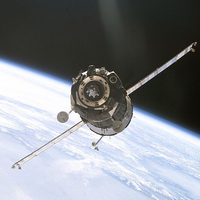While much has been said about the overall merits of the New START agreement, comparatively little attention has focused on the treaty's Article 10. This relatively short but telling passage borrows decades-old language reinforcing both the United States' and Russia's mutual obligations regarding "national technical means" (NTM) of treaty monitoring and verification -- diplomatic speak for spy satellites. Article 10 obligates both parties to use NTM in accordance with the principles of international law, to refrain from concealment measures intended to impede NTM verification of compliance, and, most importantly, not to interfere with each other's NTM.
The nod to NTM protection hints at two issues that have strategic implications far beyond arms control. Specifically, will the future U.S.-Russia space relationship be adversarial or cooperative? Perhaps more importantly, what are the greatest threats to vital U.S. and Russian national-security space assets going forward?
Closer cooperation in space will be an imperative that neither state can afford to ignore, and Article 10 reinforces a valuable norm between the world's foremost space powers. Dusty language in a new bilateral arms-control agreement, however, should be of little comfort in the face of a significant space-security threat from China and rogue powers that have little to lose and much to gain from turning a blind eye to Cold War space-security norms .

